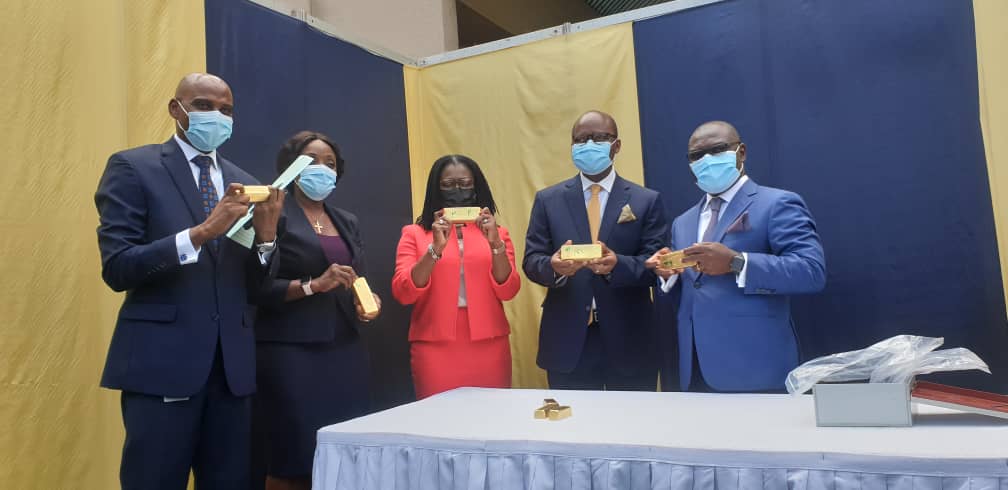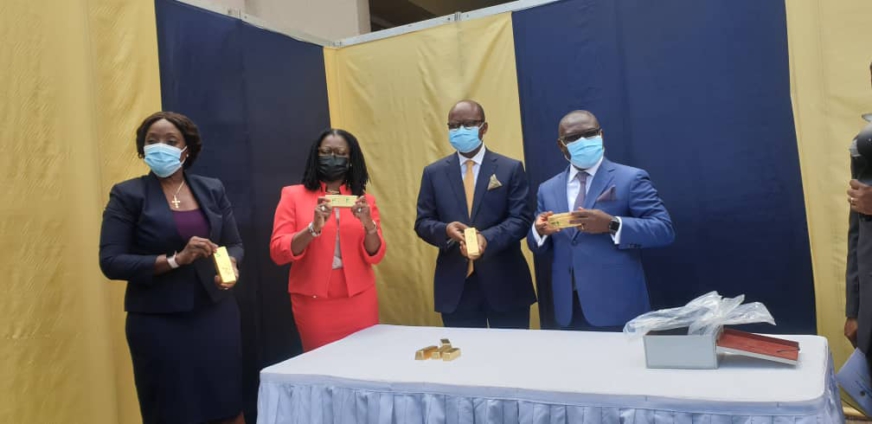The Bank of Ghana has launched the domestic gold purchasing programme to help shore its reserves.
Indeed, this is the first time the Bank of Ghana is embarking on a domestic gold purchasing to augment the country’s foreign reserves with a view to doubling Gold holdings in our foreign exchange reserves portfolio.
This thus marks a significant change in the modus operandi of Bank of Ghana’s foreign exchange reserves management operations.
Chronicling the importance of gold as a monetary asset, the Governor of the Bank of Ghana, Dr Ernest Addison said during the era of the Gold Standard, currency issued by Central Banks has to be fully backed by gold, measured in troy ounces at the time.
“This gold standard measure of assessing the strength of currencies was later abandoned at the turn of the 20th Century, when economies begun printing currencies without the backing of gold. Since this transition, currencies have been backed by a variety of instruments including gold, government bills and stocks, and first-class bills of exchange. In fact, when Ghana issued its jurisdictional currency in 1958, the original currency cover assets for the currency issued included gold, sterling, and call money in the United Kingdom, and British Treasury Bills with maturities not exceeding three months, among others.”

Furthermore, he said “the history of monetary management has revealed that while gold in the reserve cover mix was not given much weight, the managers of the economy, during the 1960-61 financial year took a bold decision to increase the amount of gold to be held in the cover asset mix for the cedi. As a result of this decision, a small amount of refined gold, valued at around US$3.7 million at that time was bought overseas and transported to the Bank’s vault. The fall in the value of Gold in the 1960s saw a shift in policy away from gold as a cover asset to foreign currency and securities.”
The Bank of Ghana ‘s foreign reserves has grown steadily over the last 15 years to current levels of almost $11.00 billion, but the portion of gold reserves has remained unchanged at 8.77 tonnes, with the average value of gold reserves held as a percentage of Gross International Reserves at 6.14%
Also, a cross country comparison shows that contrary to Ghana’s static gold holdings in its reserves, the USA and other industrialized countries in the Eurozone have continued to hold large gold reserves, post the gold standard era.
According to the International Monetary Fund (IMF) and the World Gold Council, major industrialized countries held the largest volume of gold reserves as at April 2021, followed by major emerging markets with major developing countries lagging behind the curve. Globally, Central Banks demand for Gold, over the past decade, ranks third behind Jewellery, Technology and Investment sectors.
The Governor further said the trends are revealing because Ghana has mined gold for over three centuries and for the most part, the gold is exported.
For instance, he said in 2019, Ghana was adjudged the largest producer of gold in Africa and the 7th largest in the world. Yet, in that same year, other central banks acquired a record level of 670 tonnes of gold to boost their reserves according to the World Gold Council.
During the pandemic, statistics show that there was a marginal decline in central banks’ gold demand but, the number of central bank buyers outweighed the number of sellers over the period. Most of the buyers were from emerging market countries which had lower ratios of gold-to-total reserves.
Dr. Addison said the domestic gold purchasing programme therefore sets the stage for Ghana to purchase gold as part of efforts to build its reserves, adding “this initial step will enable the Bank of Ghana to buy domestically produced gold from selected gold aggregators and mining firms and pay in the local currency at the prevailing market price.
Benefits of programme
The domestic gold purchase programme will pave the way for BoG to grow its foreign exchange reserves to foster confidence, enhances currency stability, creates a more attractive environment for foreign direct investments and economic growth.
It will also enable the Bank leverage its gold holdings to raise cheaper sources of financing to provide shortterm foreign exchange liquidity.
Meanwhile, the Central Bank has engaged other domestic mining firms in collaboration with the Ghana Chamber of Mines to buy refined gold from their refineries. At this time only one gold aggregator has been selected for the programme after an independent due diligence was conducted.
In conclusion, the Governor said the Bank of Ghana views the gold acquisition programme as an efficient way of growing the foreign exchange reserves of the country to supplement the traditional ways that Ghana has built reserves over the years.
Among others, this will help reduce the country’s dependence on more expensive ways of building reserves.
He added that the Gold purchasing programme will bring revolution to the small-scale gold mining sector.
Ghana’s domestic purchasing programme for gold has the potential to improve the small-scale gold mining sector by guaranteeing, that they receive a fair purchasing price for their gold, provide an incentive to formalise and move away from damaging environmental and social practices.
Latest Stories
-
Togbe Afede XIV calls for drastic restructuring of Bank of Ghana
3 hours -
Eric Johnson
3 hours -
Djokovic struck by water bottle at Italian Open
3 hours -
777 call in finance experts as Everton uncertainty grows
3 hours -
Casemiro left out of Brazil squad for Copa America
3 hours -
Chelsea sacking would not be a problem – Pochettino
3 hours -
Man Utd owners have ‘common sense’ – Ten Hag
3 hours -
Nduom hints at #BringBackGNBank nationwide campaign
7 hours -
GWCL staff locked up, assaulted for disconnecting defaulter
8 hours -
Akufo-Addo, Asantehene commission Prempeh I International Airport, Kumasi
8 hours -
We are confident about board meeting in June on Ghana’s second review – IMF
8 hours -
Eugene Osei Tutu: Who can lay claim to Kumasi International Airport- Mahama or Akufo-Addo?
8 hours -
Mbappe confirms he will leave Paris St-Germain
8 hours -
CAA Region II Athletics Championships will be properly organised – Dr Baah-Nuakoh
9 hours -
Over 185 state bungalows for public servants near completion in Ashanti Region
9 hours

